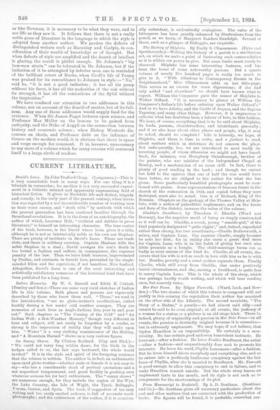Waddle's Sweetheart, by Theodora C. Elmslie (Ward and Downey), has
the negative merit of being as simply constructed as it well can be. Gladdie, a sweet, young " seaside-girl," of the kind popularly designated " quite rippin'," and, indeed, superficial rather than strong, has two sweethearts,—Charlie Butterworth, a minor, and Captain Lane. She marries Charlie, simply because he asks her first; for in reality she cares a great deal more for Captain Lane, who is in the habit of giving her such nice little presents as a bangle. The child-marriage turns out ao badly as most unions of the kind do. Charlie, at all events, dis- covers that his wife is not so much in love with him as he is with her. Besides, poverty and a cruel mother separate them. Finally Charlie, while still away from Gladdie, dies under positively heroic circumstances, and she, earning a livelihood, is quite free to marry Captain Lane. This is the whole of the story, which was perhaps hardly worth writing, and which will bear reading once, but scarcely twice.


































 Previous page
Previous page